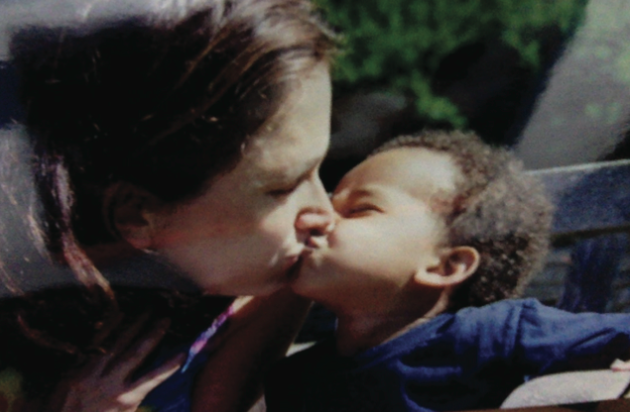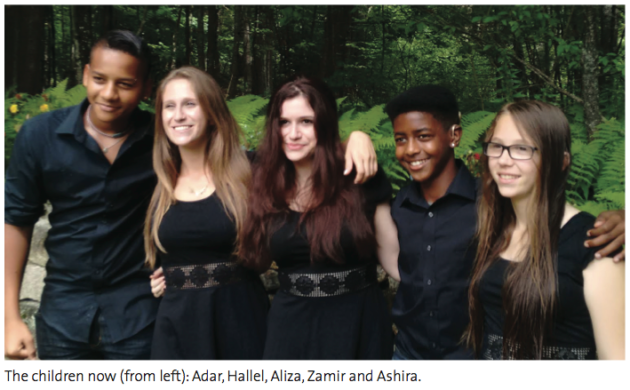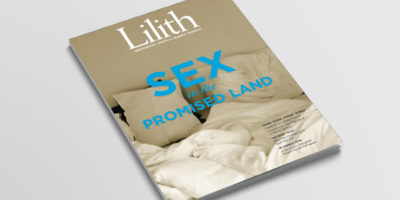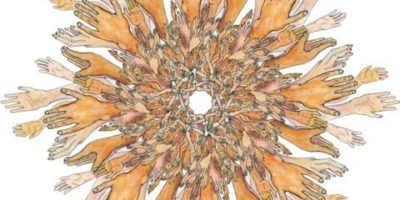
In the Ethiopian Orphanage
About to meet the baby who will become her son, her fears rise: Will I recognize him from his pictures? Am I a racist? Will he know I’m a fraud? And she moves through the holy work of adoption nonetheless.

The author and Adar.
In Addis Ababa to adopt a brother for her two daughters, Aliza and Hallel, Rabbi Susan Silverman describes meeting for the first time the boy — birth name Daniel — she and her husband, Yosef Abramowitz, are calling Adar.
My sister Jodyne and I got to our room after five in the morning, and fell into deep sleep, facing each other across the lush king-sized bed. The rabbis teach that throughout the encampments around Mount Sinai, the night before making their covenant with God, the Israelites slept a deep, unconscious sleep. God wanted them to go straight from bed to receive the Torah — the original come-as-you-are party — with their analytical skills still dozing, so that the experience was unmediated by what another Jewish guy, centuries later, would call superego. I hoped I could release my own self-consciousness when I approached the orphanage and met my son for the first time.
Even before the wake-up call from the front desk, Jody and I simultaneously opened our eyes with a start. “I hear the train a-comin’…” Jody started to sing. Johnny Cash was our theme music.
“Everything will be alright, right?” I asked my sister, suddenly serious.
“Oh, Sooz,” Jodyne said with a squeeze on my arm. “We’ll love him immediately.”
“What about Yosef and the girls. They’re okay, right?” I had a scene in my head. Two shoppers at Whole Foods, both acquaintances of ours, talking in the aisle. Piles of organic produce in their carts. Starbucks mugs in the cup-holders. Can you imagine? Her whole family killed here in Newton at the same moment she’s meeting their new son in Ethiopia….Just terrible.
On our way to the parking lot to meet Samuel, our driver, Jody gasped and pointed up to our left. What we thought in the early dawn light to be lush, green rolling hills spattered with lovely white villas was really a painted mural — a three-story billboard blocking the mass of gray, dilapidated shanties spread far and wide behind it. As we drove through the gate, I saw a man with only one leg sitting in the dirt. Rain began to fall, as if the sky could not be such a bright blue over this misery. I reached to the back seat for Jody’s hand.
There were no stoplights or crosswalks. Pedestrians, drivers, cows, donkeys and goats all aggressively negotiated their way through streets and intersections. I closed my eyes as we sped toward whatever happened to be crossing the road in front of us, wanting also to shut out the terrifying randomness of it all.
“The streets no have names,” Samuel explained as he pulled to the side of the road. “This is the right neighborhood, but now we must find the street.” He called out to two adolescent boys for directions. They smiled broadly and tried out their English: “Hello, Hello!” One climbed into the front seat with me, the other in the back with Jody, who laughed at their unfiltered exuberance. They directed Samuel with words and gestures, occasionally turning to me and Jody to say, “America, America,” or, “America good.” They laughed and elbowed each other, and got out of the car on a quiet street in front of a high, rusty fence. Samuel beeped the horn, puncturing the quiet, and a man with white hair, who looked to be in his sixties, in gray trousers and a blue and gray sweater, slid open the wide, heavy gate. There before us was the African Cradle Children’s Center.
My whole life had led to this place. Yet, I didn’t even know how to open the car door, or how to greet these exuberant children. I was awed by their smiles and voices, their beckoning. I was afraid Samuel wouldn’t come back to get us, and I’d be stuck at the orphanage forever. I was terrified that I wouldn’t love my son. Or even recognize him. I imagined myself standing there, dressed like Mrs. Banks, the mother in Mary Poppins: a nineteenth-century lady with a large white hat, ruffled blouse and billowing skirt. “Such dear orphans, poor things. I shall pat them each on the head.” I would look around frantically, unable to discern one brown child from another, my claim as a mother exposed: white American economic privilege.
Hiking up my loose cotton dress, I mounted the two-foot stone platform that ran the length of the front wall. How obvious is it that I’m accustomed to proper stairs and doors and countless other comforts? How vain was I to imagine everyone in that compound analyzing my every move? I was the epitome of writer Anne Lamott’s twin phrases: “a narcissist with an inferiority complex” and “the piece of shit around which the world revolves.”
Okay, Susan. Stop. Breathe. Get out of your own head. I was about to live the story I would tell and re-tell my growing son. When I first laid eyes on you I knew …God brought us together? You were mine? I was a fraud?
A smiling woman opened the door before I could knock. She was holding a baby girl swaddled in a ruffled pink fleece onesie. “Hallo,” she said. “I am Fitsum. I take care of the children here.”
I smiled back. “I’m Susan,” I said, trying to convey perfect-motherness. Joyful yet calm. Enthusiastic yet composed.
Narcissistic yet insecure.
I peered beyond her into the orphanage. The room was spotless, lined with white cribs. A toddler played on a woven rug in the center of the room with a woman who handed her plastic shapes. As we smiled awkwardly at each other Fitsum made no move to allow me through the rusted doorway. Why wasn’t she showing me in, leading me to Adar? Was I supposed to greet her in a specific way? Was I missing a customary saying or gesture that would let me into the inner sanctum, past these aching moments, to be with the son I had kept in my heart and would now finally hold in my arms? His soft cheeks, the feel of his breath, the weight of his body in my arms were so close that the magnetic force — the invisible tug that reached across an ocean and drew me to this one doorway, the way God brought the Israelites from slavery to Sinai — cast an irresistible pull. Why wasn’t she letting me get by?
Finally Fitsum raised the child in her arms toward me. “This is your baby,” she said, just this side of bemused.
“But…” I looked in confusion at the baby, all in pink.
Then I took in his face, the slight uplift of his eyebrows forming a peak above his nose, the “o” of his lips as he solemnly studied my face.
Adar.
I could feel Jody stifling a smirk behind me as I took my baby into my arms. Adar or, perhaps, still Daniel, twisted his body away from me and reached for Fitsum. Her eyes, like his, were shiny black and watery. Then Adar turned to me, and I kissed his forehead. He smelled like sour milk. His skin was covered in red bumps. He looked at me weirdly.
Who was I? A person alienated by my own child’s smell! Xenophobes — racists — talk about “others” in olfactory terms, and here I was already looking forward to transforming my own son with a warm, sudsy bath in the refuge of the hotel, in the opulence of the Addis Ababa Sheraton, where orphans and poverty would be relegated to the more comfortable realm of theory. Where I could call Yosef and hear him say that everything was okay. I wondered if the hotel room had cable; I could use an American sitcom before bed. Fran Drescher’s Nanny assuring the three motherless children that, yes, their father pays her to take care of them, but she loves them from her heart.
Fitsum led us into the large, open room. Jody and I glanced around. A baby around Adar’s age stood at the end of a crib and reached out to us. A toddler on the floor banged a plastic ball in my direction. At the back wall, beside the last crib, three women sat at a low children’s table on small plastic chairs like the ones at Hallel’s preschool. They had brown skin and wore clean, light-blue housecoats over dresses, their black hair pulled back into buns. With a spoon or bottle in one hand and a child in the other arm, they fed their charges with expert efficiency and soothing words. Seeing that they were not covered in baby food or struggling to keep the children still made me feel even more inadequate. The Israelites may have received the Torah in a guileless, rubbing-the-sleep-from-their-eyes state, but I received my son with self-consciousness — more guarded and awkward in my actions before these caregivers than the Israelites were before God. Pointing at me while looking into Adar’s face, Fitsum said, “Mama, Mama,” and slowly backed away. Adar whimpered and scrunched his brows in deep concern. My heart was breaking along with his. And with hers. “I had a baby boy at the same time Daniel was brought in,” Fitsum would later tell me. “My son was my baby at night, but Daniel was my baby in the day.”
Fitsum would be the closest person to a birth mother for Adar we would ever know — the woman who held, cared for and loved him for his first nine months, starting just days after the police had found him, a newborn alone on an Addis Ababa street. No other information about him had been known or recorded. Had he been wrapped in a blanket? Placed in a basket?
Jody patted Adar’s back. I steadied myself with a hand on hers. Thank God she had come to Ethiopia with me.
“What if this isn’t Adar?” I whispered, even though I knew it was. I had carried his photos for eight months, since the day the agency sent them to us when he was a couple of months old. I could have described each picture from memory: the angle of his lips (a range from knowingly crooked smile to pursed to casually parted), the intensity of his eyes, the arch of his eyebrows (“It’s cute that you’re jingling those bells, but I’ll smile for you in any case”).
“This baby is pretty like a girl,” I said, turning him to face Jody.
“It’s him, Sooz. Don’t worry.”
I looked at him face-to-face and said, baby-voiced, “We’re gonna make sure you have a penis.”
“Your first words to your son,” Jody said dreamily. “Should I write them in his baby book?”
Adar raised his eyebrows curiously at me in the Photo No. 4 “Oh, please” expression as we laid him on the large braided rug in the center of the room. I tried to look nonchalant, and non-pedo- phile, as I pulled open the waistband of his fleecy pink pants and peeked under the frayed cloth diaper with the bent safety pins. I wanted to be overjoyed, full of love, completely surrendered to the covenantal moment, but instead I was nervously checking for a penis.
“This is the first uncircumcised penis I’ve ever seen,” I whispered to my sister. “Well, sober.”
I picked up my baby and kissed him. Amid all the suffering I had seen — just in our drive from the hotel to the orphanage — how could I be silly and joking? I should be railing at God, reaching a new low of shaken faith, embracing my father’s lifelong theology: If there’s a God, He’s an asshole. I had lived my life in terror of the kind of loss that surrounded me now like the sea: dead parents, dead children. But for the first time in my whole life no voice in my head negotiated with God. No begging voices clamored to bargain or fight for anything, or demand that a capricious Ruler pay attention. I simply engaged in my end of the deal with the Creator-of-the-World in this one country, this one neighborhood, this one building and with this one boy, to make a little order. Throughout my life and then eventually through my Jewish education that, frankly, started only in rabbinical school, I had alternately rebuked and implored God, despaired of and celebrated tradition, lorded my own righteousness over some teachings and stood in humility and even shame before the vastness and depth of the tradition. But now, my sister, my new son, the caregivers and the children in this orphanage with me comprised a microcosm of love, tragedy, hope, apathy, brokenness and healing — the shattered and the whole — the promise of Sinai.
And in it I wasn’t God’s judge or God’s bitch. I was God’s partner.
Jody crinkled her nose. I took Adar over to the changing table and pulled his soft little legs out of his pants. I worried that I was overstepping by helping myself to the facilities without asking permission but, with the language barrier, neither did I want to seem like I was telling a caregiver to change him for me. I unfastened the safety pins and removed the rag that served as a diaper. There was a basket on my left that had a few other soiled items in it, and I threw this one in too. Fitsum came over, took a fresh rag, dipped it in the bucket of water to my right, and handed it to me. For a moment, we both held the same threadbare cloth, and exchanged a smile.
As I cleaned the extreme mess, which seemed to indicate some sort of parasite in Adar’s body, I saw how red, rashed and raw he was. Despite the sores, he didn’t cry at my touch. I cleaned him slowly and gently, looking into his eyes and repeating his old and new names, Dani, Adar, Dani, Adar, using just a corner of the rag before rinsing it in the increasingly dirty bucket of water. I kissed his forehead, cheeks and tummy, freshly diapered. I picked him up just as a woman came over with a baby about Adar’s age. I handed Adar to Jody and took the baby from the woman, who seemed a little surprised, but I was on a roll — I’d help out. This baby, too, was covered in sores. I dipped a fresh rag into the same water bucket and, stifling gags from the mess in her diaper, cleaned her up. Adari’s dirty diaper hadn’t bothered me at all, I realized with satisfaction. My covenant was with him. He was my son.
Finished, I turned to Adar and we took each other in. He arched his eyebrows and granted me a half smile as I spoke my first baby-book−worthy words to him, a phrase oft repeated in my family.
“You are mine forever.”
Rabbi Susan Silverman is an author, teacher and activist.
Adapted from Casting Lots: Creating a Family in a Beautiful, Broken World, by Susan Silverman. Reprinted courtesy of Da Capo Press, a member of the Perseus Books Group. Copyright © 2016.



